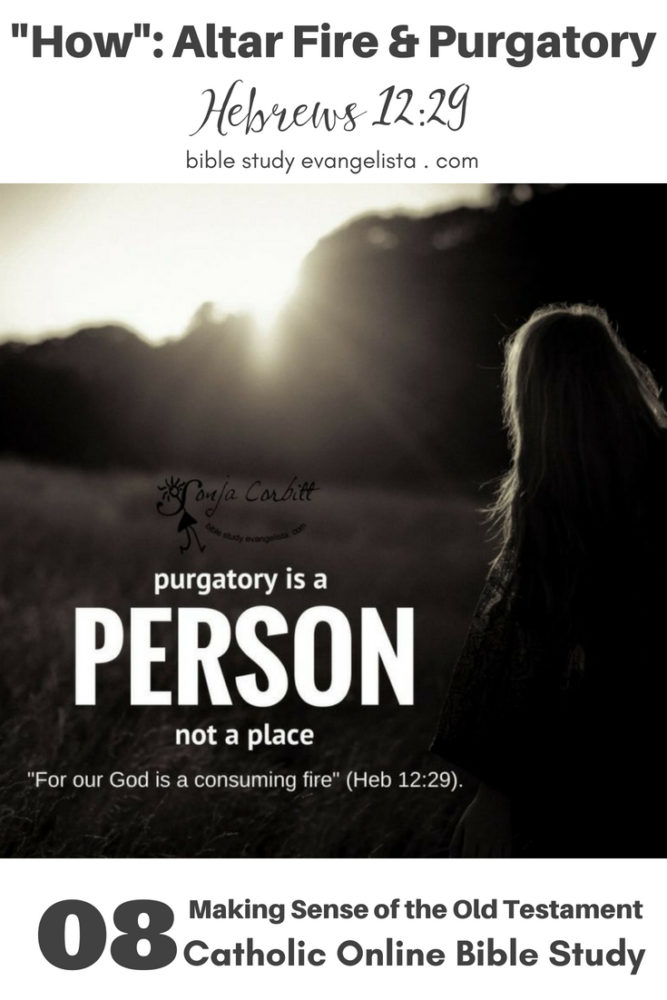The fire that fell from God’s presence onto the Old Testament altar is the same fire spoken of in the NT as the fire of purgatory which purifies, or sanctifies, us now on earth or after death (in the absence of mortal sin). Popes Gregory and Benedict XVI, along with such mystic Saints as Catherine of Genoa, Faustina, and John Paul II, have said the all-consuming fire of God’s presence, the fire of purgatory, and the fire of hell are the same fire: Trials on earth are bitter fire for the sinner, even as they purify the person of God.
Life’s “fiery trials,” then, are the all-consuming, jealous fire of God probing and purifying us deliberately, deeply, and intimately, just as the altar fire once did in the OT sacrifices. If we offer them to God willingly in Communion with Jesus’ Cross, they contribute to our salvation to the degree that we can be wholly holy at death. When our trials are viewed this way, they become our sacred offerings of love, offered in participation in Jesus’ Cross. They “save” us.

Welcome Alison W, Julie H, and Rachel M, Bible Study Evangelista’s newest friends of the show! Thank you for loving and lifting me :)
LOVE the Word™ is a Bible study method based on Mary’s own practice: lectio without the Latin.
L – Listen (Receive the Word.)
O – Observe (Choose one or more of the following personality approaches to connect the passage to your life and recent events.)
F | Franciscan – Cradle a crucifix in your hand; touch His five wounds; pray a thanksgiving prayer on each one.
I | Ignatian – Imagine you are offering an animal sacrifice at the tabernacle. What can you see around you as you lead your goat to the priest at the altar? As you lay your hand on its head and confess your sins over it, what else can you hear? What do you smell? How do you feel just before you cut its throat with your knife and bleed its blood into the pan? What are your thoughts as the priest pours the blood out around the base of the altar?
A | Augustinian – How does this week’s show make you understand and appreciate the Eucharist more? How is Jesus’ gift of His Body and Blood meant to help you be more broken and spilled out for others?
T | Thomistic – Make a list of anything new you learned about Old Testament sacrifices, and see if you can connect them to Jesus’ sacrifice.
V – Verbalize (Pray about your thoughts and emotions.)
Remembering that He loves you and that you are in His presence, talk to God about the particulars of your O – Observe step. You may want to write your reflections in your LOVE the Word journal. Or get a free journal page and guide in the right-hand margin.
E – Entrust (May it be done to me according to your word!)
.
*LOVE the Word™ exercises are offered according to FIAT: the four personalities, or “prayer forms,” explored in Prayer and Temperament, by Chester Michael and Marie Norrisey: Franciscan, Ignatian, Augustinian, and Thomistic: FIAT! These prayer forms correspond to the Myers-Briggs personality types.
Notes and References
“For our God is a consuming fire” (Heb. 12:29).
Fire in the OT:
- Genesis 15:1-17 God calls Moses from the burning bush
- Exodus 3:1-8 God leads from the pillar of cloud and fire
- Exodus 12:8-10 God descends on Mt. Sinai in a fire
- Exodus 13:17-21 God and Abraham make a covenant
- Exodus 19:18-19 the Passover lamb must be roasted and eaten
Leviticus 9:22-24, And fire came forth from before the LORD and consumed the burnt offering and the fat upon the altar.
Leviticus 6:9-13 it is stressed three times that the altar fire, once lit, must burn continuously, because every sacrifice offered in the tabernacle from this time forward was to be incinerated in the fire that originated from God’s presence.
In early Judaism, criminals whose crimes were hanging offenses were said to be cursed by God (Deut. 21:22-23).
Luke 9:23-24, And he said to all, “If any man would come after me, let him deny himself and take up his cross daily and follow me. For whoever would save his life will lose it; and whoever loses his life for my sake, he will save it.”
Peter 4:12-14, When you experience suffering voluntarily (like OT freewill offerings) “the spirit of glory and of God rests upon you.”
1 Peter 1:6-7, Fire purifies metals of the impurities that make it weaker, less valuable, and less reliable.
1 Peter 4:12, We suffer “fiery trials” to purify our faith.
Sirach 2:1-6, “Fiery trials,” especially the sufferings and humiliations suffered by those who “serve the Lord,” can cleanse us from sin and passions and purify us of the inclination to sin.
Exodus 34:14, It is the holy, jealous love of God, Himself, that purifies us.
“Either in this life or in the life to come, the soul that seeks union with God must be purged by ‘The fiery Love of God.’ The holy souls are purged of all the rust and stains of sin which they have not rid themselves in this life. The fire of purgatory is first of all The Fiery Love of God” (St. Catherine of Genoa).
1 Corinthians 3:9-17, For we are God’s fellow workers; you are God’s field, God’s building. According to the grace of God given to me, like a skilled master builder I laid a foundation, and another man is building upon it. Let each man take care how he builds upon it. For no other foundation can any one lay than that which is laid, which is Jesus Christ. Now if any one builds on the foundation with gold, silver, precious stones, wood, hay, straw– each man’s work will become manifest; for the Day will disclose it, because it will be revealed with fire, and the fire will test what sort of work each one has done. If the work which any man has built on the foundation survives, he will receive a reward. If any man’s work is burned up, he will suffer loss, though he himself will be saved, but only as through fire.
St. Faustina: “I asked these souls what their greatest suffering was. They answered me in one voice that their greatest torment was longing for God.”
Pope Benedict the XVI, teaching on the mystics, said that rather than a “place” in the depths of the earth with an exterior fire, they saw purgatory as an interior fire. They understood purgatory to be the soul’s experience and awareness of God’s immense love and perfect justice. The soul suffers for not having responded appropriately to the perfect love it “sees” and experiences. This suffering is just, and is the simple, natural consequence of habitual separation of one’s will from love. It is precisely the love of God Himself which purifies the soul from the ravages of sin (General Audience, 1.12.11).
“The Church gives the name Purgatory to this final purification of the elect*, which is entirely different from the punishment of the damned… The tradition of the Church, by reference to certain texts of Scripture, speaks of a cleansing fire.
“As for certain lesser faults, we must believe that, before the Final Judgment, there is a purifying fire. He who is truth says that whoever utters blasphemy against the Holy Spirit will be pardoned neither in this age nor in the age to come. From this sentence we understand that certain offenses can be forgiven in this age, but certain others in the age to come” (CCC 1030-1031).
Episode Resources
Fulfilled, Uncovering the Biblical Foundations of Catholicism, Chapter 5, Sacrificial Love
Ignite, Chapters 6 & 7, The How of the Bible
Read the Transcript
You can download a complete, word-for-word transcript.
Protected Content. Click Here to sign in
Courtesy of Kristie Hynniman who does our transcriptions for you.
___
Image: https://unsplash.com/@sashafreemind



Love this teaching. Lord, do what you need to do to get us to where you want us to be.
Amen!
I was looking for a father Ronald Knox Bible. I heard they were working on publishing in it a couple years ago but I haven’t heard anything since then. Any thoughts?
I found one a while back but didn’t get it because I realized I already had his notes in my study software. I can’t remember now where I found it!
Thank you this has explained so much. You bible studies speak to me and help understand my catholic faith.
To the person who was asking about the Fr. Knox Bible — you can get it from Baronius Press.
God bless!